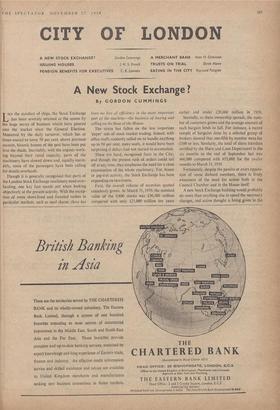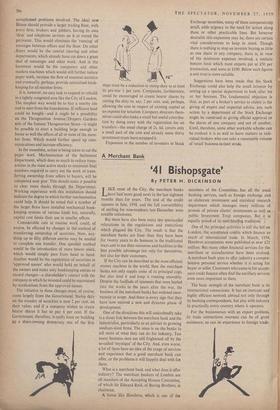CITY OF LONDON
A NEW STOCK EXCHANGE? Gordon Cummings A MERCHANT BANK Peter H. Dickinson ISSUING HOUSES J. H. S. French TRUSTS ON TRIAL Derek Moore PENSION BENEFITS FOR EXECUTIVES C. R. Lowndes EATING IN THE CITY Raymond Posigcne
A New Stock Exchange ?
By GORDON CUMMINGS
Lite the sturdiest of ships, the Stock Exchange has been severely strained at the seams by the huge waves of business which have poured into the market since the General Election. Measured by the daily turnover, which has at times soared to some 50 per, cent, above previous records, historic booms of the past have been put into the shade. Inevitably, with the engines work- ing beyond their rated capacity, parts of the machinery have slowed down and, equally inevit- ably, some of the passengers have been calling for drastic overhauls.
Though it is generally recognised that parts of the London Stock Exchange machinery need over- hauling, one key fact stands out when looking objectively at the present activity. With the excep- tion of some short-lived and frenzied rushes in particular markets, such as steel shares, there has
been no loss of efficiency in the most important part of the machine—the business of buying and selling on the floor of the House.
The strain has fallen on the less important `paper' side of stock market trading. Indeed, with office staffs suddenly called on to handle anything up to 50 per cent. more work, it would have been surprising if delays had not started to accumulate.
These are hard, recognised facts in the City; and though the present rush of orders could tail off at any time, they emphasise the need for a close examination of the whole machinery. For, boom or jog-trot activity, the Stock Exchange has been expanding on two fronts.
First, the overall volume of securities quoted ceaselessly grows. At March 31, 1959, the nominal value of the 9,800 stocks was £30,500 million compared with only £23,000 million ten years earlier and under £20,000 million in 1939.
Secondly, as share ownership spreads, the num- ber of customers grows and the average amount of each bargain tends to fall. For instance, a recent sample of bargains done by a selected group of brokers showed that one-fifth by number were for £100 or less. Similarly, the total of share transfers certified by the Share and Loan Department in the six months to the end of September last was 466,000 compared with 655,000 for the twelve months to March 31, 1959.
Fortunately, despite the passive or overt opposi- tion of some diehard members, there is lively awareness of the need for action both in' the Council Chamber and in the House itself.
A new Stock Exchange building would probably do more than anything else to speed the necessary changes, and active thought is being given to the
complicated problems involved. The ideal new House should provide a larger trading floor, with every firm, brokers and jobbers, having its own `desk' and telephone services on it or round the perimeter. This would eliminate the 'running' of messages between offices and the floor. On other _floors would be the central clearing and other departments, which already have cut down a great deal of messenger and other work. And in the basement would be the computers and other modern machines which would still further reduce paper work, increase the flow of essential statistics and eventually, perhaps, provide centralised book- keeping for all member firms.
It is, however, no easy task to expand or rebuild in a tightly congested area like the City of London. The simplest way would be to buy a nearby site and to start from the foundations. If sufficient land could be bought—and it might be a possibility on the Throgmorton Avenue/ Drapers Gardens side of the famous Throgmorton Street—it might be possible to erect a building large enough to house as well the offices of all or most of the mem- ber firms. Which would further speed up com- munications and increase efficiency.
In the meantime, action is being taken to cut the paper work. Mechanisation of the Settlement Department, which does so much to reduce trans- actions in the most active stocks to minimum final numbers required to carry out the work of trans- ferring ownership from sellers to buyers, will be completed next year. This should make it possible to clear more stocks through the Department. Working experience with this installation should indicate the degree to which further mechanisation could help. It should be noted that a number of the larger firms have installed mechanical book- keeping systems of various kinds but, naturally, capital cost limits their use in smaller offices.
Considerable cuts in routine work could, of course, be effected by changes in the method of transferring ownership of securities. Now, any- thing up to fifty different entries may be needed to complete one transfer. One speedier method would be the introduction of more bearer stock, which would simply pass from hand to hand. Another would be the registration of securities in 'approved names' who would hold on behalf of the owners and make only bookkeeping entries to record changes—a shareholder's contact with the company in which he invested could be maintained by notifications from the approved names.
The initiative in these changes must, of course, come largely from the Government. Stamp Auty on the transfer of securities is now 2 per cent, on their value; and if a company wishes to create bearer shares it has to pay 6 per cent. If the Government, therefore, is really keen on building up a share-owning democracy one of the first steps must be a reduction in stamp duty to at least its pre-war 1 per cent. Companies, furthermore, could be encouraged to create bearer shares by cutting the duty to, say, 2 per cent. and, perhaps, allowing the cost in respect of existing capital as an expense for taxation. Company directors them- selves could also make a small but useful contribu- tion by doing away with the registration fee on transfers—the usual charge of 2s. 6d. covers only a small part of the cost and already some thirty investment trusts have scrapped it.
Expansion in the number of investors in Stock Exchange securities, many of them comparatively small, adds urgency to the need for action along these or other practicable lines. But however desirable this expansion may be, there are certain vital considerations to keep in mind. Though there is nothing to stop an investor buying as little as one share in any company, there is, in view of the minimum expenses involved, a realistic bottom limit which most experts put at £50 per transaction, and some at £100. Below such figures a unit trust is more suitable.
Suggestions have been made that the Stock Exchange could also help the small investor by setting up a special department to look after his or her business. The fundamental objection is that, as part of a broker's service to clients is the giving of expert and impartial advice, any such action by a department of the Stock Exchange might be construed as giving official approval, to the shares of one company and not of another. Until, therefore, some other workable scheme can be evolved it is as well to leave matters to indi- vidual brokers who can take a reasonable volume of 'small' business in their stride.



























































 Previous page
Previous page